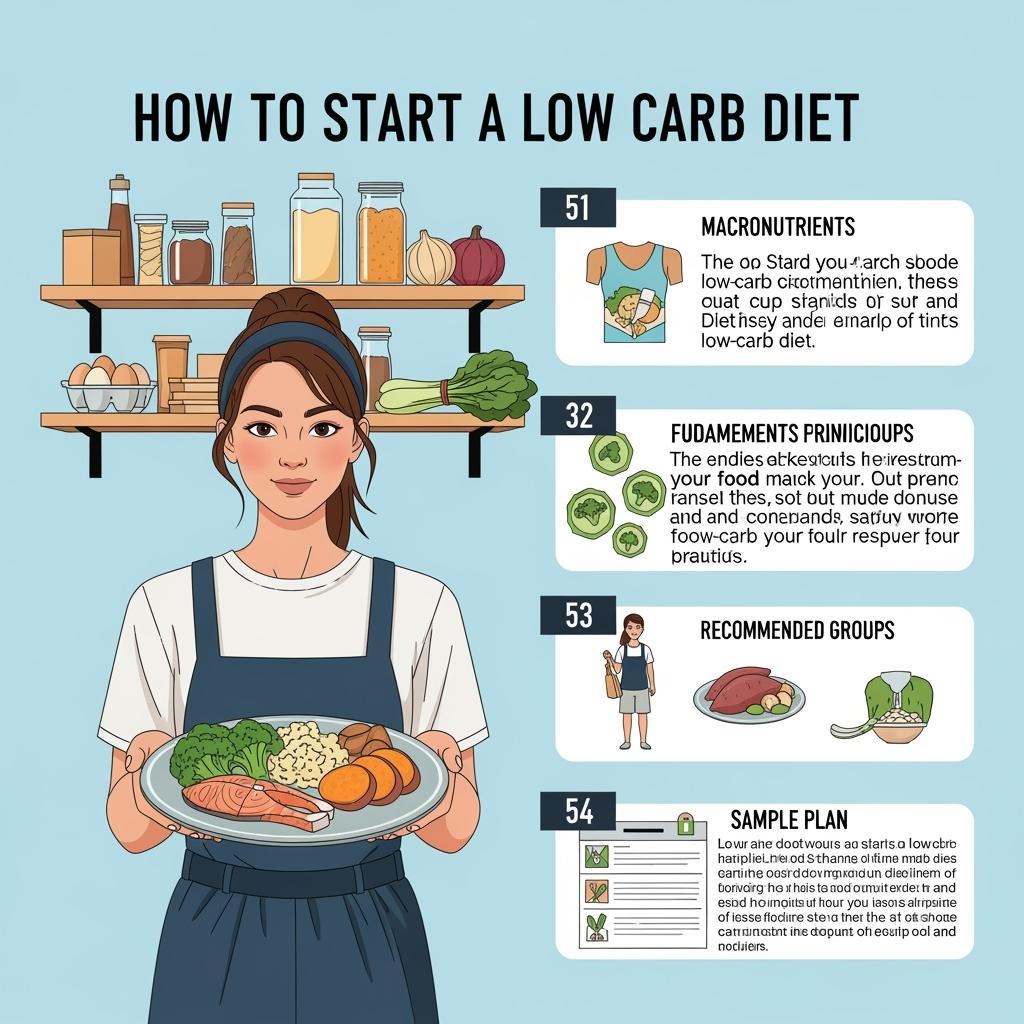Science-Backed Strategies That Actually Work
Low-carb diets have emerged as one of the most effective and sustainable approaches to weight loss, backed by decades of scientific research and millions of success stories. Unlike restrictive fad diets that leave you feeling deprived and hungry, a well-designed low-carb eating plan can help you shed pounds while maintaining energy levels and enjoying satisfying meals.
Understanding Low-Carb Diets: More Than Just Cutting Carbs
A low-carb diet fundamentally changes how your body processes energy by reducing carbohydrate intake and encouraging the use of stored fat for fuel. When you limit carbs to typically 20-150 grams per day, your body enters a metabolic state that prioritizes fat burning over glucose burning. This shift creates multiple weight loss advantages that extend far beyond simple calorie restriction.
The magic happens at the cellular level. Without readily available glucose from carbohydrates, your liver begins converting stored fat into ketones, which serve as an alternative fuel source. This process, called ketosis, transforms your body into a fat-burning machine while simultaneously reducing hunger hormones and stabilizing blood sugar levels.
The Science Behind Low-Carb Weight Loss Success
Research consistently demonstrates that low-carb diets outperform traditional low-fat diets for weight loss. A landmark study published in the New England Journal of Medicine found that participants following a low-carb approach lost significantly more weight than those on calorie-restricted low-fat diets, even when eating until satisfied rather than counting calories.
The weight loss mechanisms go beyond simple calorie mathematics. Low-carb diets reduce insulin levels, the hormone responsible for fat storage. Lower insulin allows your body to access stored fat more easily while preventing new fat accumulation. Additionally, protein intake typically increases on low-carb plans, boosting metabolism through the thermic effect of food – your body burns more calories digesting protein than carbohydrates or fats.
Water weight loss provides immediate motivation during the first week. Carbohydrates bind to water molecules in your body, so reducing carb intake naturally eliminates excess water retention. While this initial drop isn’t pure fat loss, it creates positive momentum and reduces bloating, making you feel lighter and more confident.
Different Types of Low-Carb Approaches
The beauty of low-carb eating lies in its flexibility. Several variations accommodate different lifestyles, preferences, and weight loss goals.
The ketogenic diet represents the most restrictive approach, limiting carbs to 20-50 grams daily while emphasizing high fat intake. This creates rapid ketosis and often dramatic initial weight loss. However, the strict requirements can be challenging for beginners or those with active social lives.
Moderate low-carb diets allow 50-100 grams of carbs daily, providing more flexibility while maintaining weight loss benefits. This approach works well for people who exercise regularly or prefer a more sustainable long-term eating pattern.
Liberal low-carb plans permit 100-150 grams of carbs, focusing on eliminating refined sugars and processed foods while retaining nutrient-dense carb sources like vegetables and limited fruits. This gentler approach often works better for people transitioning from high-carb diets.
Cyclical approaches alternate between strict low-carb days and higher-carb refeed days, potentially optimizing both fat loss and athletic performance. These advanced strategies require more planning but can be highly effective for experienced dieters.
Foods to Embrace on Your Low-Carb Journey
Success depends on choosing nutrient-dense, satisfying foods that support your weight loss goals. Protein sources form the foundation of effective low-carb eating. Grass-fed beef, wild-caught fish, pastured eggs, and organic poultry provide essential amino acids while keeping you satisfied for hours. These foods have minimal carbs but maximum nutritional value.
Healthy fats deserve a prominent place on your plate. Avocados, olive oil, nuts, seeds, and fatty fish like salmon provide sustained energy while supporting hormone production and nutrient absorption. Contrary to outdated dietary advice, these fats won’t make you gain weight when consumed as part of a low-carb plan.
Non-starchy vegetables become your primary carbohydrate source, delivering vital nutrients and fiber with minimal impact on blood sugar. Leafy greens, broccoli, cauliflower, zucchini, and bell peppers add volume and nutrition to meals without derailing ketosis.
Full-fat dairy products like cheese, yogurt, and butter can support weight loss when consumed mindfully. Choose organic, grass-fed options when possible to maximize nutritional benefits and minimize exposure to hormones and antibiotics.

Foods to Avoid for Maximum Weight Loss
Refined carbohydrates represent the biggest obstacle to low-carb weight loss success. Bread, pasta, rice, and cereals spike blood sugar and insulin levels, promoting fat storage and triggering cravings. Even “healthy” whole grain versions can sabotage your progress.
Sugar in all its forms must be eliminated or severely restricted. This includes obvious sources like candy and soda, but also hidden sugars in condiments, sauces, and processed foods. Read labels carefully, as sugar appears under dozens of different names.
Processed foods often contain hidden carbs and inflammatory ingredients that impede weight loss. Focus on whole, unprocessed foods to maximize both weight loss and overall health benefits.
Starchy vegetables like potatoes, corn, and beans contain too many carbs for most low-carb plans. While nutritious, these foods can prevent ketosis and slow weight loss progress.
Practical Implementation Strategies
Starting a low-carb diet requires preparation and planning. Begin by clearing your pantry of high-carb temptations and stocking up on approved foods. Meal planning becomes crucial for avoiding impulsive food choices that could derail your progress.
Track your carb intake initially using a food diary or mobile app. This awareness helps you identify hidden carbs and ensures you stay within your target range. Most people underestimate their carb consumption, making tracking essential for success.
Prepare for the transition period, sometimes called the “low-carb flu.” As your body adapts to burning fat instead of glucose, you might experience temporary fatigue, headaches, or irritability. These symptoms typically resolve within a few days to a week. Stay hydrated, maintain adequate electrolyte intake, and get sufficient rest during this adjustment phase.
Plan for social situations and dining out by researching restaurant menus in advance and having backup meal options ready. Many restaurants accommodate low-carb requests when you communicate your needs clearly.
Maximizing Results Through Smart Lifestyle Choices
Exercise enhances low-carb weight loss by depleting glycogen stores and encouraging fat burning. Resistance training helps preserve muscle mass during weight loss, maintaining your metabolic rate. High-intensity interval training can accelerate fat loss while improving cardiovascular health.
Sleep quality significantly impacts weight loss success. Poor sleep disrupts hormones that regulate hunger and satiety, making it harder to stick to your eating plan. Aim for seven to nine hours of quality sleep nightly to optimize your weight loss results.
Stress management supports long-term success by preventing cortisol-driven cravings and emotional eating. Incorporate stress-reduction techniques like meditation, yoga, or regular walks into your routine.
Hydration becomes even more important on low-carb diets. Aim for at least half your body weight in ounces of water daily, increasing intake during hot weather or intense exercise.
Sustainable Success and Long-Term Maintenance
The most effective low-carb approach is one you can maintain long-term. Focus on developing healthy habits rather than pursuing quick fixes. Allow flexibility for special occasions while returning to your eating plan consistently.
Monitor your progress through multiple metrics beyond just weight. Take body measurements, progress photos, and note improvements in energy levels, sleep quality, and overall well-being. Weight can fluctuate due to many factors, but these additional markers provide a more complete picture of your success.
Consider working with healthcare providers familiar with low-carb approaches, especially if you have underlying health conditions or take medications. Some medications may need adjustment as you lose weight and improve metabolic health.
Build a support system of friends, family, or online communities who understand and encourage your lifestyle choice. Having accountability partners significantly increases your chances of long-term success.
Remember that sustainable weight loss is a marathon, not a sprint. Focus on creating healthy habits that will serve you for life rather than pursuing rapid but unsustainable results. With patience, consistency, and the right approach, low-carb eating can help you achieve lasting weight loss while improving your overall health and quality of life.





